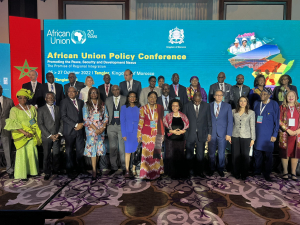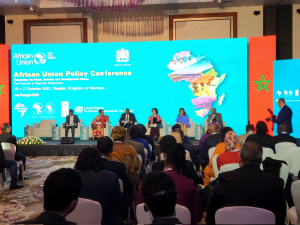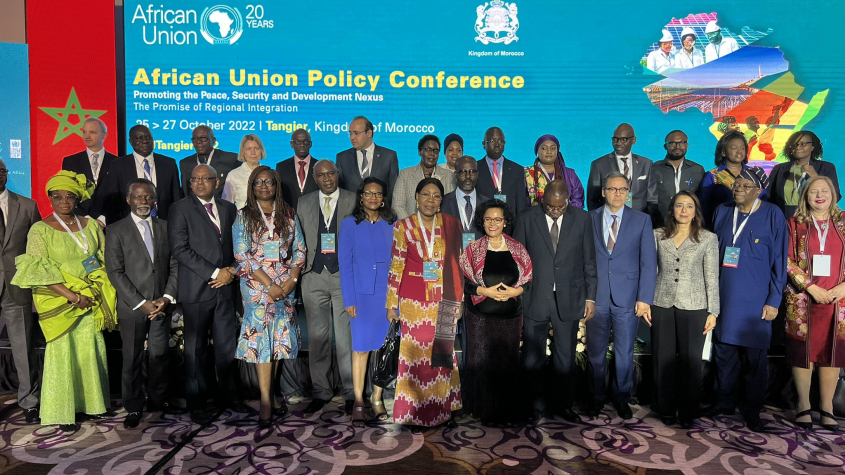AU: Promoting the Triple Nexus — Peace, Security and Development
The African Union Policy Conference on the Triple Nexus between peace, security and development featured reflections on strategies of simultaneously promoting development and integration, along with peace and security.

It is a universal belief that there can be no sustainable development without peace and no peace without sustainable development. Hence, despite the complex nature of the interlinkages between peace and development, it remains unarguable that the former cannot be achieved without the latter, and vice versa. This underscores the recent global paradigm shift of viewing sustainable development from the peace, security, humanitarian and human rights nexus.
Therefore, it is not by mere coincidence that Africa’s most impoverished nations, such as Somalia, the Central African Republic (CAR) and South Sudan, are also the continent’s most unstable countries. Empirical data shows how various conflicts around the continent impede the development of African Union Member States, who continue to divert resources meant for national development to addressing insecurity. In 2021 alone, Sub Saharan Africa’s military expenditure totaled US$20.1 billion.
These expenditures constitute significant strain on African countries’ budgets, threatening social investments in health, education, water, and sanitation, which calls for the Triple Nexus approach factoring security into development interventions. The reality is, Africa’s integration and development depends entirely on its ability to foster an atmosphere of peace and stability, without which none of its grand development programmes, policies and initiatives, including the African Continental Free Trade Area (AfCFTA), will achieve their desired objectives.
It was against this backdrop that the African Union Policy Conference themed: “Promoting the Peace, Security and Development Nexus: The Promise of Regional Integration” was held October 25 – 27 in Tangier, Morocco. The Conference was an opportunity for African stakeholders from the AU, Regional Economic Communities (RECs), national governments, academia, defense and security, private sector, civil society, and international development, to reflect on strategies of simultaneously promoting development and regional integration, along with peace and security.
The conference was organized by the AU Commission, the Economic Commission for Africa (ECA), the African Development Bank (AfDB), the United Nations Development Programme (UNDP) as well as the African Export-Import Bank (Afreximbank).
In his welcoming remarks, Mr Nasser Bourita, Minister of Foreign Affairs, African Cooperation and Moroccan Expatriates of the Kingdom of Morocco, said his country had from its first term in the AU Peace and Security Council (PSC) [2018 – 2020] and during its presidency of the Council in December 2019, always ensured the Triple Nexus was on the PSC’s agenda, owing to its understanding of sustainable development as a “tool to mitigate the perpetuation of violent conflicts and the fragmentation of society.”
“Globally, 8 of the 18 countries with a dramatically deteriorating security situation between 2020 and 2021 are in Africa. The human cost of terrorism has reached record levels with a tenfold increase in the number of deaths between 2007 and 2021. The economic cost of terrorism has increased ninefold since 2007. The economic impact of terrorism in Africa amounts to 171 billion USD over the last 10 years,” the minister told delegates at the conference via a video message.
Mr Bourita therefore said an appreciation of the correlation between peace, security and development should be the basis of any approach to preventing conflict and building sustainable peace in Africa, noting that while the AU had invested a lot in actionable polices that will help Africa benefit from its enormous potential, the realization of its aspirations requires more commitment towards addressing current and emerging challenges.
Accordingly, the foreign minister made three far-reaching recommendations, namely the setting up of an AU Development Fund, akin to the Peace Fund, dedicated to financing Africa’s sustainable development; Strengthening coordination among key Triple Nexus entities i.e the African Peace and Security Architecture (APSA), the African Governance Architecture (AGA), African Union Development Agency (AUDA-NEPAD) and AfDB; as well as institutionalization of a multistakeholder “Tangier Process” to foster Africa’s stability and development.
In his opening statement, Amb Albert Muchanga, the AU Commissioner for Economic Development, Trade, Tourism, Industry and Minerals, said the Policy Conference was focused on the inter-linkages between peace, security and sustainable development and their implications on realizing the AU vision of “creating an integrated, prosperous and peaceful continent driven by its citizens.”
“Still for Africa at the political, peace and security levels, there are also the challenges of the resurgence of unconstitutional changes of governments, varying intensities of armed conflicts, popular uprisings, violent confrontations, and violent extremism. At the level of economic integration, the disruptive tendencies of armed conflicts can adversely affect implementation of the Agreement Establishing the AfCFTA,” cautioned Muchanga.
The AU chief said it was in view of the foregoing that the AU Assembly of Heads of State and Government adopted the Silencing the Guns campaign in 2013 as one of the flagship projects under Agenda 2063, adding that the Assembly would, to this end, convene an extraordinary session on industrialization, economic diversification and the AfCFTA, come 25 November in Niamey, Niger.
“What is clear is that without peace, security and stability, sustainable development in Africa is not possible for a number of reasons. The first one is that resources, both human and financial, are diverted from sustainable development programming to fighting and the humanitarian assistance that emerges from displacement of people as a result of conflict. The second one is that in a violent conflict situation, the past gains of economic, social and political progress are wiped out and buried in the rubble created by the violent conflicts.”

In her remarks, Ms Amina Mohammed, Deputy Secretary-General of the United Nations, said conflict and insecurity makes sustainable development impossible, just as the lack of sustainable development contributes to rising social tensions and unrest, noting that today’s intensifying global crises, namely the climate crisis and Covid-19 pandemic had been exacerbated by the war in Ukraine, leading to spiralling costs for food, energy, and finance whose consequence was widening inequalities.
“Many of our African countries are suffering under this burden. Sustainable development, as guided by the 2030 Agenda and the AU’s Agenda 2063, is still our best chance to address the root causes of conflict and to ensure we leave no one behind. Getting the SDGs back on track requires coordinated action by peace, political, humanitarian and development actors. We must build on existing initiatives that provide comprehensive, integrated approaches, including the UN Integrated Strategy for the Sahel and the Lusaka Roadmap for Silencing the Guns in Africa.”
Ms Mohammed thus called for reflection on practical measures to implement the development, humanitarian, peacebuilding nexus so as to deliver peace, security, and sustainable development everywhere in Africa, including strengthening joint conflict analysis, enhancing conflict prevention mechanisms, and ensuring the meaningful participation of women in peace processes.
“How can we creatively accelerate economic integration under the CFTA? How can we reform national agricultural policies to sustain food systems, protect livelihoods and promote social cohesion? Investing in the nexus means investing in root causes and solutions to crises, investing in sustainable and inclusive development, ensuring that basic investments in livelihoods, jobs, health are protected and prioritized while a country navigates political crises or humanitarian emergencies,” she stressed.
Dr Hanan Morsy, Deputy Executive Secretary of the ECA, said the promise of the AfCFTA was being threatened by the various conflicts around the continent, as well as climate-induced disasters and their resultant impacts on life, investments, and productive capacities. She said, in the last decade, 60% of forcibly displaced people were from low and middle-income countries in Africa and the Middle East, with 5 of the 10 countries hosting the most displaced persons being African.
In addition, Dr Morsy said the ECA had just completed a study titled: “Triple Nexus and Trade: Towards a New Agenda for Africa” which focuses on the implications of trade reforms for security and peace. Using the displacement of people as a proxy for the Triple Nexus, and based on the premise that large scale human displacement often results from a mixture of conflict, fragility, and vulnerability, the ECA study demonstrates the relevance of trade in countering fragility and promoting effective transitions from war to peace.
“Between 2010 and 2020 when conflicts intensified in most regions in Africa, including in the Sahel, several recurring factors were observed. These include armed conflict, environmental degradation and desertification, flooding, drought, ethnic tensions, local grievances, food insecurity, severe poverty, terrorist attacks, fragile government, and political instability. ECA’s analysis provides a basis for informing the content, resource requirements and sequencing of corrective measures needed in conflict zones and disaster areas,” she noted.
The ECA Chief Economist said the study went beyond exploring the trade implications of conflict and the emerging evidence that trade enhances resilience at national, regional, and global levels, justifying the integration of trade into the Triple Nexus. In addition, Dr Morsy said the report reveals the extent to which Africa’s export-oriented economies rely on export-oriented and commodity-linked investments.
“In 2020, almost 45% of the EU’s €900 million humanitarian budget was allocated for supporting long-term displaced peoples and refuges in the Sahel, the Lake Chad Basin, CAR, Democratic Republic of Congo (DRC) and South Sudan. Yet, this is a drop in the ocean in comparison to the Triple Nexus funding opportunity of US$ 60 billion a year, based on the aid flows to 58 fragile countries, most of which are in Africa and Asia,” she noted.
In a video message, Ms Ahunna Eziakonwa, UNDP Africa Regional Director, said the continent’s development journey was at an inflection point such that, while many African countries were well on their way towards democratic consolidation and economic prosperity – with young and dynamic populations finding more opportunities to build their own futures – Sub-Saharan Africa was also becoming the epicenter of terrorist activity, recording nearly half of all terrorism- related deaths in 2021.
Ms Eziakonwa described human security as a public good, without which the momentum generated by the AfCFTA, among other AU regional integration initiatives, will eventually diminish, hence the need for a better appreciation of the Triple Nexus to inspire new forms of responses. She said UNDP’s participation in the Triple Nexus conference was aimed at fostering discussions on two crucial issues.
“The first is the particular situation of communities living in Africa’s borderland regions. We see the critical role regional integration can play as a driver for mobility, labour diversification and healthy cross-border social cohesion in Africa’s borderlands. The second issue is a better understanding of complex political transitions in Africa. Based on upcoming primary research, UNDP seeks to provide more nuanced insights on the drivers of recent military coups to effectively support countries experiencing varying forms of complex transitions,” noted the UNDP’s Assistant Administrator.
Ms Hassatou N’Sele, AfDB’s Vice President for Finance, said often development was viewed exclusively from the prism of achieving prosperity and more equitable standards of living, hence development actors naturally focus on socio-economic growth, the provision of health and education, as well as improvements in infrastructure; they seldom approach development from a holistic and security perspective.
“Security and development interventions are seldom looked at from a holistic perspective. And yet, we all know, security cannot be disentangled from development. It must be factored into our development interventions and investment choices. For example, military intervention, or the use of force to re-establish peace and order only buys time. It does not address the root causes of insecurity or bring about sustainable peace,” she warned.
However, Ms N’Sele said the trend was gradually changing as multitudes of international development initiatives in conflict situations were now attempting to better address the security-development nexus. Although she described this as encouraging, the AfBD CFO was concerned that critical questions in designing effective security and development-related assistance strategies remain unanswered.
“For example, does justice come first in a post-conflict setting? What is the place of NGOs and private military companies in peacekeeping and peacebuilding operations? How does a country prepare and implement effective strategies to simultaneously promote security, justice, and governance reforms? How do we create sufficient incentives to induce previously reluctant or violent local actors to buy into an unfolding peace process? These are profound questions that are difficult to answer and there are obviously no one-size fits all solutions,” she noted.
The AU said the 3-day convening reaffirmed the strong linkages between peace, security and development, providing a unique platform for policymakers as well as peace, security and development practitioners to explore strategies for advancing AU-led strategic partnerships for building peace, resilience and prosperity in Africa. To this end, conference delegates pledged to promote Africa’s integration and development, through the free movement of people, goods and services, as well as harmonization of economic, financial and monetary cooperation.
A joint press statement by the organising partners released a day after the conference called for enhanced collaboration and information sharing among African stakeholders and international partners; improved capacities for planning and implementation of programmes and peacebuilding projects as well as inclusive and accountable governance. The statement also underlined the role of the border communities in promoting regional integration and the linkages between intra-African trade, industrialization, infrastructure development and peace.
The climax of the conference was the adoption of the Tangier Declaration, as a roadmap paving the way for the Tangier Process of cooperation between actors in support of lasting peace in Africa.
















